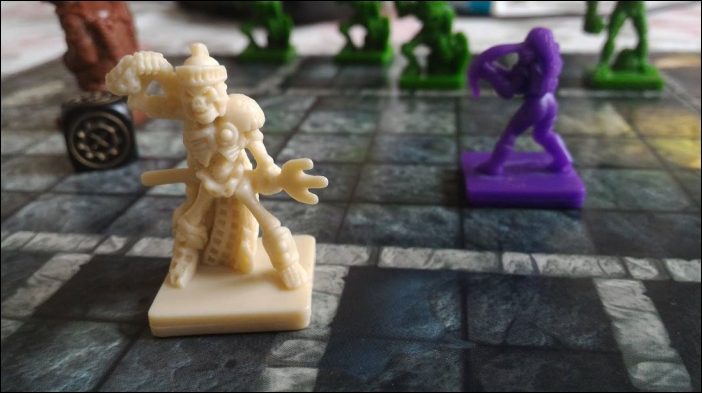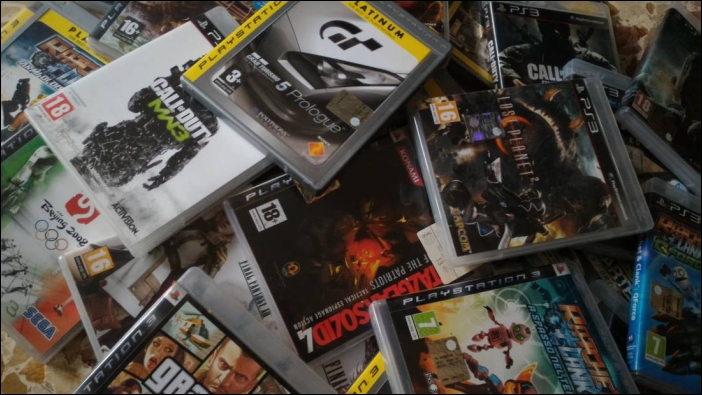Gaming has an interesting and ancient history. It goes back as far as the ancient Egyptians with a game called Sennet. Long after the reign of the great Egyptian Kings, the ancient Greeks and Romans saw games as a way to display strength and stamina. However, as time has elapsed, games have not only developed from the marble pieces of Sennet or the glittering swords of battles, they have also adapted to changes in media: from stone to paper, and from paper to technology. We have seen the rise and development of physical games (for example, table and card games) to games that need us to physically move our characters by using our bodies and peripherals (Playstation Move, WiiMote), to interact with the game environment (Wii Sports, Heavy Rain). So now, not only do we have the ability to create 3D virtual worlds with virtual reality, we can enter their worlds as well. Just like the following image, which is from Dungeons and Dragons, games don't have to take on a digital form, they can also be physical.

Dungeons and Dragons board with figurines and dice
Now, let's take it a step further and observe the different types of games that exist. There are games to teach, to train, to escape reality with, and games to transform ourselves. As we can see in the following image, there are tons of games that we can play, and across varying platforms as well!

Many different types of game that are available
To begin, you have your games for entertainment. They may have some other elements such as some accurate historic facts (Assassin's Creed, Civilization), but their main purpose is to entertain us. They can exist across a range of different genres from shooter (Call of Duty) to adventure (Fable) and can be played either alone (Alone in the Dark, Alan Wake, Metro 2033) or with company both near and far (Word of Warcraft, Dota 2, Guild Wars 2). Other genres include:
Action: These games offer intensity of action as the primary attraction. They challenge the player in many ways, such as testing their hand-eye coordination and their ability to react to enemies.
Adventure: These games can send us to magical faraway lands where majestic animals live and wealth and fortune await. They focus on story and problem solving to get from one part of the game world to another.
Arcade: These games give us an experience similar to those from the past and provide us with the opportunity to kill invaders, destroy blocks, and dodge barrels as they inevitably hurl towards us. Gaming experiences are in essence diverse and there is definitely no one-size-fits-all approach to choosing them, let alone to create or design them.
Educational: These games aim to teach us about real-world concepts and can complement the work that we may do in the classroom.
Fighting: These games place us in the ring with an enemy, or two, and bring out the fighter in us. They often feature players competing against each other in a battle of strength and endurance.
Horror: These games have us terrified, unable to move while our hearts are racing as we turn every corner; horror games are what nightmares are made of. They feature overwhelmed protagonist(s), an oppressive atmosphere, and a need for careful management of resources (ammo, health, and so on).
Massively Multiplayer Online (MMO): These games are just that. They are games that contain large amounts of players, from all corners of the globe, engaging in various types of gameplay. Players engage in real time and encourage social interaction. They can traverse various detailed and immersive worlds, or solve puzzles against enemies or with allies. MMO's also allow the player to engage with intricate storylines while completing various quests throughout the worlds.
Music/Rhythm: These games get you into a rhythm where the player has to input the same synchronized action to a beat or melody such as singing with the right pitch or pushing buttons on a guitar in the right sequence.
Platformer: These games are all about platforming . They require the player to jump from one edge to another; sometimes straight into enemy characters over terrifying voids, flames, or even poisonous liquid.
Puzzle: These games require focus and concentration. They test your mental skills as well as your dexterity and reflexes.
Racing/Driving: These games are where the player drives a vehicle of some kind and races against either other players or time. Such games may create or even break friendships (such as Mario Kart).
Role Playing Games (RPG's): RPGs allow us to live out our fantasies as other people or even species. We can be whoever we want, wherever we choose.
Shooters (First-Person Shooter (FPS)/Third-Person Shooter (TPS)): These games require the player to go around as a lone agent, team, or rogue and kill anything that moves. These fast-paced games bring out the competitive element within us. We might forge strong bonds or in some cases destroy them.
Simulation: These games simulate parts of a reality.
Sports: These games allow you to race, swim, and fly. We can live the dream of extreme sports (without the risk) or become an athlete that inspires us.
Strategy: These games require you to think outside the box; they challenge your logic and question your reasoning. It is up to you, the player, to come up with plans and tactics to overcome all the challenges that you will face.



